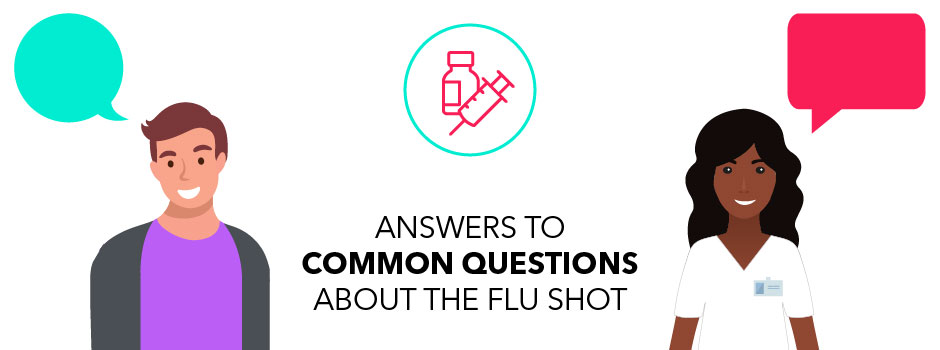
I received my flu shot last year. Do I really need a flu shot this year?
- It is important to receive your flu shot every year, regardless of what happened the previous year.
- It is also important to get your flu shot to protect others and to try to reduce the strain on our health-care system, which is already strained by a shortage of health workers.
Can I get the flu shot and the COVID-19 vaccine at the same time?
- Yes. The Canadian Immunization Guide states that COVID-19 vaccines can be given at the same time—or any time before or after—other vaccines, including the flu shot.1
Can I get the flu shot and the RSV vaccine at the same time?
- Yes. The Canadian Immunization Guide states that the RSV can be given at the same time—or any time before or after—other vaccines, including the flu shot.2
I am up to date with my COVID-19 and RSV vaccines. Do I still need a flu shot?
- Yes, you still need your flu shot. COVID-19, RSV and the flu are all caused by different viruses. It is important to be vaccinated for COVID-19, RSV (if eligible) and influenza to help protect yourself, as well as others, from these viruses.2,3
- COVID-19, RSV and the flu can all cause mild to life-threatening infections. There is an increased risk of severe complications from the flu for those who are younger than 5 years of age, older than 65 years of age, pregnant, or who have chronic diseases or weakened immune systems.3
Are there any side effects from the flu shot?
- The most common side effect from the flu shot is discomfort at the site of the injection (sore arm). This may include pain, swelling and/or redness.3 This is temporary and goes away in a day or 2. Some individuals may also experience nasal congestion and a runny nose.3
- The most common serious reaction is an allergic response to one of the components of the vaccine.4 It is important to notify your pharmacist if you have a known allergy to any components of the influenza vaccine before receiving the shot. After you receive your vaccine, it is important to wait for a set time (recommended by your pharmacist or health-care provider) to ensure that you are properly monitored for any signs of an allergic reaction.3
Why do I get a cold every year, despite getting the flu shot?
- The flu is different from the common cold. Colds and the flu are caused by different viruses. While the symptoms of both may be similar, the flu typically has a more rapid onset and the symptoms are usually more severe.4
- For flu, common symptoms include fever, cough and muscle aches. In children, nausea, vomiting and diarrhea are also common.4
- For a cold, common symptoms usually include a runny and congested nose. It is rare to have a fever with a cold.3 Unlike the flu, colds usually do not lead to more serious health problems like pneumonia or hospitalization.4
Why do I need the flu shot if I am young and healthy?
- Even if you are young and healthy and may not experience any severe symptoms from the flu, you can still transmit the flu to others, especially those who are high risk.4 People at high risk include the elderly, children under 5 years of age, pregnant people, and those who have weakened immune systems.3
- It is important to get your flu shot to help protect those in your community who are at higher risk of severe illness from the flu.
Why does it seem that in some years everyone is getting the flu despite being vaccinated?
- When creating the annual flu vaccine, scientists predict which flu strains are going to be most common that year. The effectiveness of the vaccine will depend on which strains of influenza actually do become most common.3
- Some years, the prediction may be a little off, resulting in influenza infections that aren't covered by the vaccine.3 In this situation, there may be more cases of the flu compared to the previous year even though many people are vaccinated.
Should I get the flu shot if I am pregnant or breastfeeding?
- Yes. People who are pregnant are at high risk of experiencing severe symptoms from the flu, and this is dangerous for both the pregnant person and the baby.1 It is recommended that pregnant people receive the inactivated influenza version of the vaccine, which is available only by injection.5 The recombinant influenza vaccine may be used;4 however, there is limited safety data in this patient population.6 The nasal spray is not recommended due to less research regarding its safety and possibly lower efficacy in pregnancy.3,6
- It is recommended that people living with pregnant individuals also receive the influenza vaccine as infants <6 months of age are at increased risk of complications from the flu but aren’t yet eligible to receive the vaccine.3
- Influenza vaccines (inactive, recombinant and live) are considered safe to use when breastfeeding.3,6
References:
- COVID-19 vaccines: Canadian Immunization Guide. Government of Canada web site. Updated February 5, 2025. Accessed September 15, 2025.
- Respiratory syncytial virus (RSV) vaccines: Canadian Immunization Guide. Government of Canada web site. Updated May 14, 2025. Accessed September 15, 2025.
- Statement on seasonal influenza vaccine for 2025-2026. Government of Canada web site. Updated April 30, 2025. Accessed September 15, 2025.
- Differences between a cold and the flu. Gouvernement du Québec web site. Updated October 6, 2022. Accessed September 15, 2025.
- Updated guidance on influenza vaccination during pregnancy. Government of Canada web site. Updated December 18, 2023. Accessed September 15, 2025.
- Immunization in pregnancy and breastfeeding: Canadian Immunization Guide. Government of Canada web site. Updated May 29, 2025. Accessed September 15, 2025.
